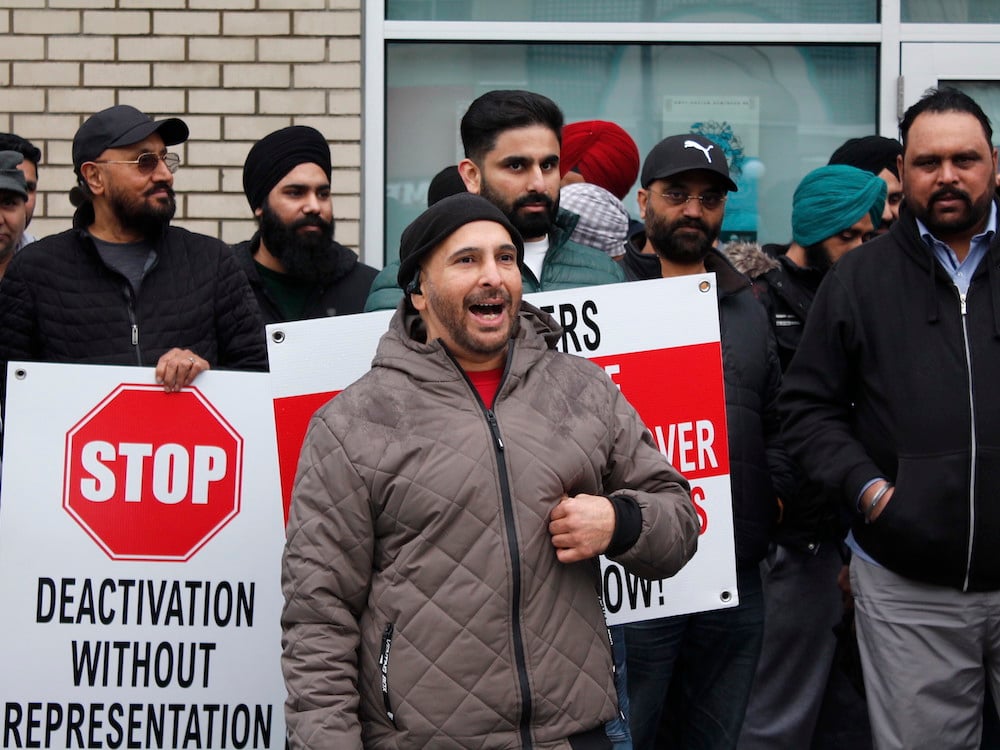You may have met Kuljeet Singh. He might have driven you to your aunt’s birthday party, picked you and your friends up after a late night at the bar or got you to work on a snowy day.
He would have been behind the wheel, one of thousands of people in Metro Vancouver driving for Uber, Lyft, DoorDash and a host of other businesses. While few solid figures exist, the provincial government estimated last year that as many as 11,000 residents worked in ride-hailing, and 27,000 worked for food delivery companies.
You probably wouldn’t have recognized Singh last week, when he roared into a microphone in front of roughly 100 people on a drizzly day, demanding better treatment for gig workers like him.
Dozens of drivers sacrificed time, and therefore money, to stand outside Labour Minister Harry Bains’ constituency office in a Surrey strip mall. They took turns speaking in Punjabi. A white car pulled up, the trunk packed with samosas and chai. At one point they began chanting: “Shame, shame, Harry Bains.”
This group of often faceless workers has become a mobilized force in British Columbia, and a thorn in the side of companies and politicians alike.
In November, Bains introduced legislation on gig work that he said set a new national precedent. It includes stipulations on minimum pay, transparency, the right to join a union and workers’ compensation coverage if drivers are involved in an accident on the job.
Many details of the new regulations are still being hammered out. The Ministry of Labour said they would be introduced this year but has no exact timeline.
“Ministry staff continues to engage with all of the groups who will be affected by the changes, including app-based workers, companies, labour organizations and others,” Bains said in a statement. “In fact, meetings with app-based ride-hail and food delivery workers are taking place this week.
“These new standards and protections are coming after the regulations are finalized this spring, with some time allowed for companies to implement these important changes.”
Some drivers, like Khushwinder Samra, say the regulations announced so far don’t go far enough to address low earnings for workers.
Another driver, Vicky Sharma, argues the bill leans in favour of companies instead of workers or consumers.
“There is no transparency. You never know how much a customer is paying or how much you are getting,” Sharma said.
Drivers organize
Gig workers are not easy to organize. They have no common work site. The job is transient; you can be driving for DoorDash or SkipTheDishes or Lyft one day and leave the next.
Singh and Sharma said drivers began to meet each other at the Vancouver airport, often while waiting for passengers. Talk turned to the downturn in their wages.
Gradually, they built up a WhatsApp group, which today boasts more than 800 members. It’s a small fraction of the number of people who work on such apps in the Metro Vancouver area, but more than enough to organize a protest.
Singh and other drivers are routinely quoted by media writing about new gig economy legislation. When Bains unveiled the bill, Singh and fellow driver Raj Gill were there with him.
At the time, Singh was divided on the legislation. He liked the fact it called for transparency about what customers pay — a big frustration for ride-hailing drivers who suspect the company takes a bigger slice of their earnings than promised.
But over time Singh and other drivers in this tight-knit group have decided the bill does not go far enough.
“On a slow day, sometimes we’re making less than minimum wage,” Samra said.
Samra began driving for Uber in January 2020, using it to supplement money he was making working for Canada Post.
At the time, Uber and other ride-hailing companies had just begun operating in B.C. Samra was making good money and switched to driving for Uber full time.
Then “everything fell apart,” Samra said. As more drivers joined the app, he was getting fewer trips. When he did pick them up, they paid less. Other drivers have similar stories. Parvish Kumar left his gig at a taxi company to begin driving for a ride-hailing company, he said, because the pay was originally better. But now, his pay has fallen.
“We have to work up to 14 hours to make a decent wage. I start at 6 in the morning and I finish up at 6 or 8 at night,” Samra said. He has considered finding another job but says he feels stuck.
“What they do is they trap the driver and the customer by initially providing good incentives. People leave their other full-time jobs. And then they play their hand,” he said.
Bains’ bill would set a new minimum wage for drivers like Samra, ensuring they receive 120 per cent of minimum wage, or just over $20 an hour.
But that rate applies only to the “engaged time” when a driver is actively on the move. And many drivers say they spend a significant chunk of their time waiting or searching for new rides.
“If we’re working 80 hours, we’re spending 40 hours sitting and waiting for rides. We’re not paid anything for that 40 hours,” said Sharma.
Drivers also have complaints that don’t fall squarely in Bains’ responsibilities. Some, for example, say they need dedicated drop-off and pickup points in Vancouver, just like taxis. They say parking tickets from that municipality are a constant problem.
And some have argued Metro Vancouver should follow Toronto by placing a cap on the number of ride-hailing drivers allowed to work. A City of Vancouver spokesperson said the number of licences for such vehicles grew from 15,886 in 2021 to 25,532 in 2023. That growing number of drivers — and their frustration — is one of the reasons this group has become so mobilized and vocal.
Drivers aren’t alone in their criticisms. Bains’ bill stipulates gig workers would be employees under the government’s employment law. But in the same stroke, the bill also excludes them from some benefits guaranteed by that law, like sick pay. Sussanne Skidmore, president of the BC Federation of Labour, said in a previous interview with The Tyee that she worries those kinds of carve-outs set a dangerous precedent.
What is certain is that the gig workers are no longer faceless drivers. They’re here, organized — and angry.
“The legislation they bring is given by Uber, actually, so basically that’s what we’re asking him to change. We want legislation that favours drivers and customers,” Sharma said. ![]()
Read more: Rights + Justice, Transportation, Labour + Industry, BC Politics

















Tyee Commenting Guidelines
Comments that violate guidelines risk being deleted, and violations may result in a temporary or permanent user ban. Maintain the spirit of good conversation to stay in the discussion and be patient with moderators. Comments are reviewed regularly but not in real time.
Do:
Do not: